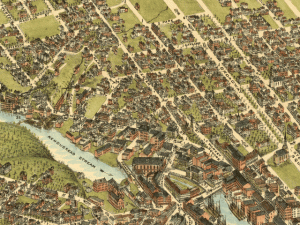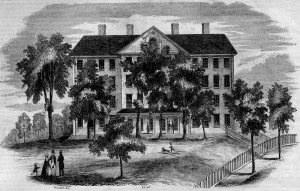Them’s Fightin’ Words in Bangor, Maine
From The New-York Times August 13, 1861:
BANGOR DEMOCRAT OFFICE DESTROYED
BANGOR, Me., Monday, Aug. 12.
At 1 o’clock this afternoon the Bangor Democrat, a secession sheet, was “cleaned out” by a large number of people. During an alarm of fire a crowd entered the office, cleared it of everything it possessed, and burned the contents in the street. Mr. EMERY, the editor of the paper, escaped unharmed. A man named JONES, who made some demonstrations in opposition to the acts of the mob, was badly used, but was finally rescued and put in jail.
From The New-York Times August 16, 1861:
SUPPRESSION OF THE BANGOR DEMOCRAT.
From the Bangor (Me.) Whig, Aug. 14. At a quarter before one, yesterday, an alarm of fire was given, and the engines passed up State-street. No fire was found; but upon the return of the people, a crowd was found gathered in West Marketsquare, and a large number of persons in the office of the Bangor Democrat, throwing the materials out of the windows. The office was completely gutted, and the stands, cases, and newspapers afterward burned in the Square. The crowd subsequently cleaned out the barber’s-shop of J. JONES, on Kenduskeag Bridge, — the cause of which, we understand, was a personal attack made by JONES upon Mr. JOHN WYMAN, for remarks that he had made in relation to the secession editors of the Democrat. JONES met WYMAN on the street, and invited him to step into his office. MR. WYMAN complied, and after reaching the barber’s shop, JONES asked him what he meant by the remarks he made. Mr. W. responded to the effect that he was not responsible to him (JONES) for what he said. After some further remarks, JONES made an attack upon WYMAN, striking him in the face, which was returned by Mr. WYMAN. The excited crowd, hearing of the collision, went into the shop and threw the furniture into the street. From the commencement of this unfortunate civil war, we have uniformly deprecated any resort to violence towards the office of the Bangor Democrat, and have used our personal influence to prevent any attack upon it. Months ago we knew of an intention to destroy the office, and in conjunction with others, persuaded those engaged in it from carrying out their intentions. Since that time, we have uniformly counseled forbearance and moderation. But all has been in vain. The people have determined that a secession organ should not exist in our city. The editors and managers of that paper have been deaf to all expostulation, all entreaty, all representations of the danger to which they subjected themselves. They have persisted in endeavoring to inflame the public mind against what they called this “unholy war” — they have continued to publish articles full of ill-concealed exultation at the repulse of our troops at the battle of Bull Run, and of the slaughter of our brave volunteers in that action — have uniformly favored the cause of rebellion against that of the Union — and in so doing, have but brought upon themselves the irrepressible indignation of the people. We have carefully abstained from any comments which might instigate violence against the establishment, although many facts have come to our knowledge showing the deleterious influence of the paper. No longer ago than last week, a young lady just from the South, informed us that the day before she left a Southern State, a gentleman called upon her and said he had understood she was going to Bangor. She replied that she was. ‘Then,’ said he, ‘I desire you, as soon as you arrive, to seek out the editor of the Bangor Democrat and shake hands with him for me, and in my name and that of the citizens of this place thank him for his fearless advocacy, of the Southern cause, and for the encouragement which his paper has given us.’ And the lady says that in consequence of the representations of the Bangor Democrat, which is read or quoted throughout the Southern States, the people there believe that the people of Maine have held great ‘Peace Conventions,’ and are prepared to oppose the ‘unholy war,’ and yield to the demands of the South. The effect of such facts upon the public mind hero can well be conjectured. It has been found impossible to prevent an outbreak of public sentiment, deplore it as we may.”
Partly due to the influence of Bangor Theological Seminary, Bangor was a center of anti-slavery sentiment.
There is an interesting overview of Maine in the Civil war at DownEast.com. Marcellus Emery was the editor of the Bangor Democrat. Maine’s support of the war was against its economic interests. According to DownEast.com:
Sumter electrified Maine. Actor John Wilkes Booth — southern sympathizer and future assassin — was completing a run of Richard III in Portland when the news arrived; assessing the mood, he wisely, quickly skipped town, not pausing to pay his bills.


